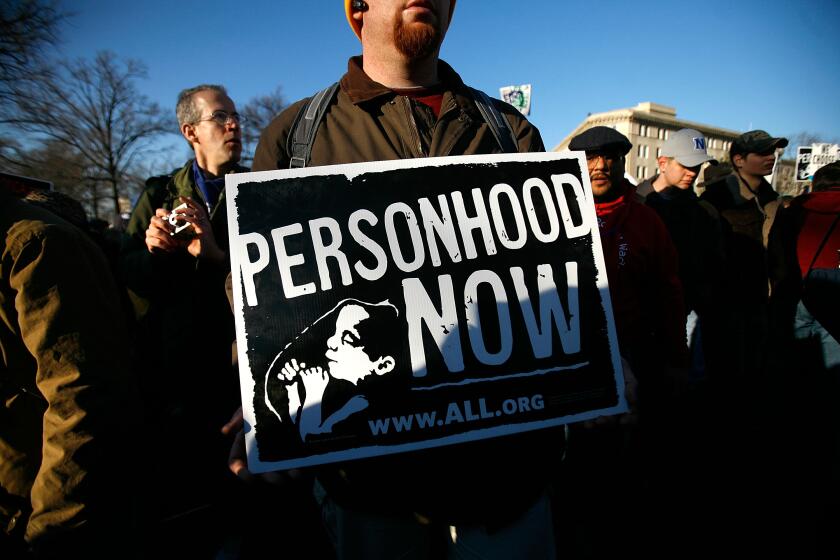They changed the wording in party platform, but the GOP still wants to ban abortion

- Share via
It’s not surprising that the Republican Party took out of its platform, after decades, support of a national abortion ban.
Not that Donald Trump and his new vice presidential running mate, Sen. J.D. Vance of Ohio, have had some epiphany and renounced their long-standing opposition to reproductive rights. It’s more likely that party leaders realized the stance risks alienating the millions of voters in conservative and swing states who support reproductive rights. States that voted for Trump in 2020, such as Ohio and Kansas, more recently voted to enshrine abortion rights into their state constitutions or rejected measures that would prohibit doing so after the Supreme Court overturned Roe vs. Wade in 2022.
So instead, the party slipped a seemingly innocuous statement into its platform, which delegates approved this week at the Republican National Convention, about standing for “families and Life.” That sounds reasonable, but it’s much more sinister than it seems.
Has Donald Trump succeeded in pushing the Republican Party closer to the center on abortion, where most voters are?
The statement continues with the observation that the 14th Amendment “guarantees that no person can be denied Life or Liberty without Due Process, and that the States are, therefore, free to pass Laws protecting those Rights.” It then proclaims, “After 51 years, because of us, that power has been given to the States and to a vote of the People.” This is a reference to the Supreme Court taking away the federal right to abortion.
It may be subtle, but it is clearly signaling that the party hasn’t changed its values. It’s a call for more fetal personhood laws, which can be much more extreme and wide-reaching than abortion bans. These laws confer all the same rights on fetuses in a uterus — and sometimes just fertilized eggs — of any person walking around. More significantly, the fetus’ rights supersede those of the pregnant woman.
The proposed Republican Party platform closely mirrors former President Trump’s campaign promises.
It’s outrageous that anyone would support laws that take away personhood rights from pregnant women while bestowing that status on their fetuses. As with all antiabortion statutes, they turn the pregnant person into little more than an incubator.
There are already 18 states with some kind of fetal personhood law or fetal personhood protection established by court decisions, according to Pregnancy Justice, an organization that advocates for the rights of pregnant people. Depending on how they are interpreted, personhood laws could affect access to abortion, in vitro fertilization (IVF) procedures and certain types of contraception such as IUDs because they occasionally act after fertilization.
Personhood statutes were kept in check by Roe vs. Wade. Now that Roe is overturned it’s possible these laws could be used to ban abortion. For example, just days after the Supreme Court decision in the Dobbs case, abortion services stopped in Arizona because it has a law on the books granting personhood to fetuses, embryos and fertilized eggs. Advocates successfully got part of the law blocked in federal court. There are likely more legal fights ahead here and in other states with similar laws.
In antiabortion arguments we are witnessing a fanatical desire to draw irrevocable distinctions around personhood and bodies.
But the reason to worry about these laws is that they could be used not just to stop a person from getting an abortion but criminalize a pregnant person for falling down a flight of stairs, using even legal drugs or having a miscarriage. “You are making that person a walking crime scene,” says Karen Thompson, the legal director of Pregnancy Justice.
Fetal personhood laws may also end up stopping IVF procedures. The Alabama Supreme Court decision this year that frozen embryos have the same rights as children provoked a national uproar and caused IVF clinics in the state to suddenly stop services. (Alabama then passed a law protecting IVF providers from civil and criminal liability for loss of embryos during the treatments.) Interestingly, the GOP platform also specifically states the party supports IVF.
Trump continues to take credit for putting three justices on the Supreme Court who were instrumental in overturning Roe vs. Wade. Even as he tries to disown his past support for a national ban, he refused to tell Time magazine in April if he would veto such a ban if he becomes president. His running mate opposed the Ohio ballot measure last year enshrining abortion rights in the Ohio Constitution. He signed a letter from a group of Republican senators and Congress members last year calling on Atty. Gen. Merrick Garland to enforce part of a moribund 19th century vice law, the Comstock Act, that could be used to ban the mailing of abortion pills.
This new statement in the platform is just a change in language, not values. The GOP will not protect a woman’s right to control her own body. And voters should not think otherwise.
More to Read
A cure for the common opinion
Get thought-provoking perspectives with our weekly newsletter.
You may occasionally receive promotional content from the Los Angeles Times.








